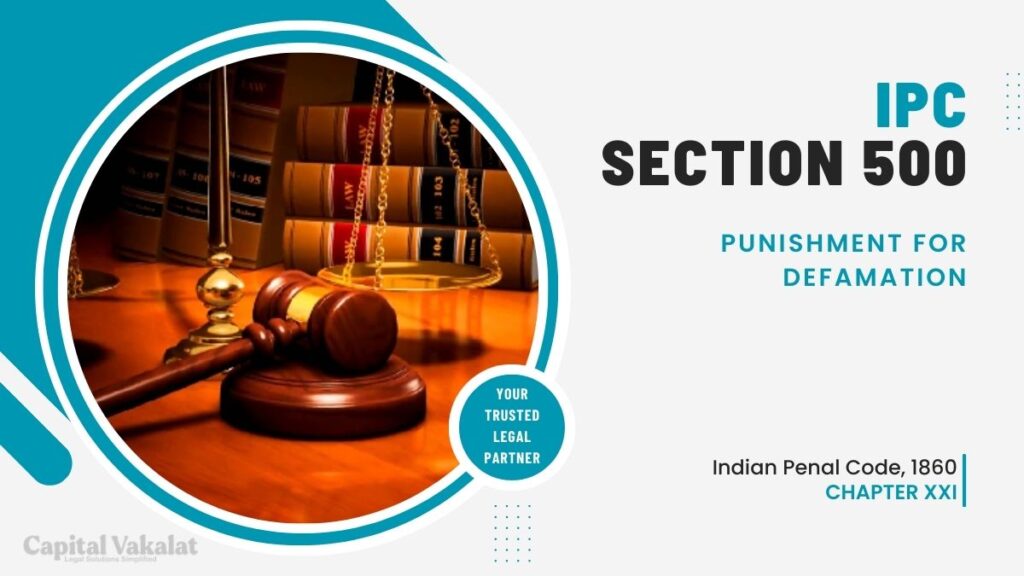Defamation, a term often thrown around in legal discussions, holds significant weight in the eyes of the law. At its core, defamation involves making false statements that harm the reputation of an individual or entity. Section 500 of the Indian Penal Code (IPC) deals explicitly with the punishment for defamation.

In this article, we will delve into the nuances of Section 500 IPC, exploring its implications, landmark cases, defenses, and its relevance in the digital age.
Understanding Defamation
Before we dissect Section 500 IPC, it is crucial to understand what defamation entails. Defamation can take two primary forms: slander and libel. Slander involves spoken defamatory statements, while libel pertains to written or published defamatory remarks. Both forms share the common goal of damaging the reputation of the subject.
Elements of Defamation
To establish a case of defamation, certain elements must be present. Firstly, there must be a false statement that is communicated to a third party, constituting the act of publication. Additionally, this false statement must result in damage to the reputation of the individual or entity in question. Understanding these elements is pivotal in comprehending the legal intricacies of defamation.
Section 499 IPC: What Constitutes Defamation?
Section 499 IPC outlines what constitutes defamation in the eyes of the law. Examining this section provides valuable insights into the legal criteria that must be met for an act to be deemed defamatory. By exploring real-world examples, we can better understand the application of Section 499 IPC.
Section 500 IPC: Punishment for Defamation
The heart of the matter lies in Section 500 IPC, which prescribes the punishment for defamation. Individuals found guilty of defamation can face severe consequences, including imprisonment and fines. This section acts as a deterrent, emphasizing the seriousness with which the legal system views harm to one’s reputation.
Landmark Defamation Cases
To appreciate the impact of defamation laws, it is essential to examine landmark cases that have shaped legal interpretations. Notable cases have set precedents, influencing how subsequent defamation cases are approached and adjudicated. Analyzing these cases provides valuable context to Section 500 IPC.
Defenses Against Defamation Charges
While the consequences of defamation are substantial, the law also recognizes certain defenses. Truth, privilege, and consent of the affected party are among the defenses that can be invoked to counter defamation charges. Understanding these defenses adds depth to the discussion on Section 500 IPC.
International Perspectives on Defamation
A global perspective on defamation laws reveals diverse approaches and punishments. Comparing defamation laws across different jurisdictions sheds light on the variations in legal frameworks. This broader view helps us appreciate the unique aspects of Section 500 IPC within the global legal landscape.
Challenges and Criticisms
No law is without its critics, and Section 500 IPC is no exception. Examining the criticisms and challenges posed to defamation laws allows us to evaluate potential areas for improvement. Modern perspectives on reputation, privacy, and free speech contribute to ongoing discussions about the relevance of defamation laws.
Impact of Technology on Defamation
The advent of technology has introduced new challenges to defamation laws. Social media platforms and online publications have amplified the reach of defamatory statements, requiring a reevaluation of existing legislation. Addressing the intersection of technology and defamation is crucial for maintaining the effectiveness of Section 500 IPC.
Conclusion
In conclusion, Section 500 IPC stands as a formidable deterrent against the defamation of individuals and entities. As we navigate the complex terrain of reputation and legal consequences, understanding the nuances of defamation laws becomes increasingly vital. The evolving landscape, marked by technological advancements and changing societal norms, necessitates continuous scrutiny and adaptation of defamation laws to ensure justice prevails.
Frequently Asked Questions
How has social media changed the landscape of defamation cases?
Social media has significantly increased the speed and reach of defamatory statements, posing new challenges for legal frameworks globally.
Can public figures be defamed more easily than private individuals?
Defaming public figures often involves a higher burden of proof, considering the importance of free speech and public discourse.
Are there international standards for defamation laws?
Defamation laws vary globally, and there are no universal standards. Each jurisdiction tailors its laws to its cultural and legal context.
Can opinions be considered defamatory?
Generally, opinions are protected as free speech, but if presented as false facts, they may cross into defamatory territory.